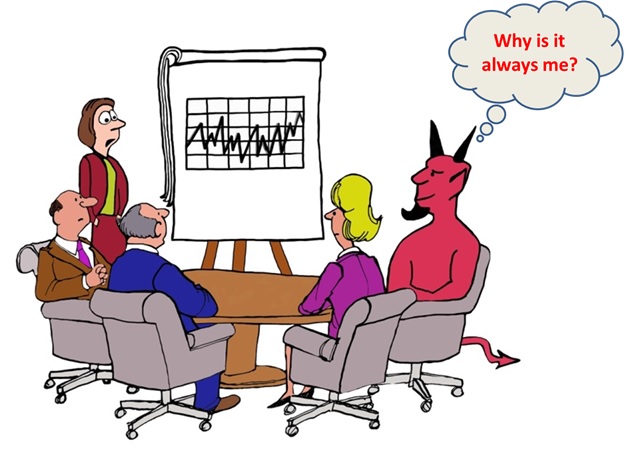From my perch as a consultant, the only thing worse than not being asked for an opinion on a key issue, is to get the question when it’s too late to affect the decision.
So queries like “What do you think of our new billboards?” or “How does our new afternoon drive jock sound?” leave us in a difficult lurch because there really isn’t an answer or response that can make a difference when the call’s already been made.
The other awkward moment is when you sense you’re in a room with a team that really isn’t interested in hearing a differing point of view. You can tell when everyone is looking for consensus, rather than that an outside opinion that might send everyone back to the drawing board.
As consultants, we’re paid to offer our assessment, like it or not.
And that brings me to the “devil’s advocate” issue. I once worked for a programmer who never met an idea he didn’t take a contrarian position on. You’d throw out an idea – especially something that you’ve seen work in multiple situations – and he’d invariably respond with “Let me play devil’s advocate for a moment…”
It happened so often it got tedious. But the “devil’s advocate” position – when not overused – can be a valuable tool in any meeting.
I was reminded of the power of the “devil’s advocate” position while reading the Sunday New York Times’ “Corner Office” column. The CEO in the spotlight was Kevin Lofton who heads up the Catholic Health Initiatives. While explaining how the culture of his organization differs from other companies, he said this:
“In our senior management meetings, we appoint a designated devil’s advocate, as we call it. So if we’re discussing a critical issue, we’ll appoint someone – and the role rotates – to be the devil’s advocate, no matter what their personal point of view is. That helps you avoid groupthink.”
It’s a great idea because it also avoids the “odd man out syndrome” where it’s always the same person playing the “Yeah, but…” role in meeting after meeting.
And it forces the team to grapple with the possibility that an idea has flaws, downsides, or simply needs further marinating time in order to be successful and effective. You have to wonder if the “devil’s advocate” position couldn’t have stopped, slowed down, or modified truly flawed concepts from Windows 8 to “Ishtar” to the Amazon Fire Phone.
The “devil’s advocate” position – when wisely deployed – can take a promising idea and make it that much better when the room goes through the discipline of questioning its assumptions. The process of challenging the group’s logic, and distilling ideas is an important step that often goes missing when everyone starts drinking the Kool-Aid.
Some of you may be thinking that this flies in the face of the “Rules of Brainstorming,” where participants are encouraged not to be critical of one another in the ideation process. While in the early stages of creative thinking, it is a good idea not to stifle freewheeling, when concepts morph into reality, it’s a whole different thing.
There is such thing as a bad idea. And the “devil’s advocate” position is a safeguard to ensure it doesn’t come to life.
In both Jacobs Media and jācapps, I know this process would be helpful and it’s something we’re going to implement. And as I think about many of the meetings I participate in for a multitude of different brands, there is often a strong need for some pushback against the meeting momentum that is the catalyst for launching truly bad concepts.
A “DDA” – “designated devil’s advocate” – may be just the thing to keep a challenged industry digging deeper to come up with that next great idea that just might work.
Or prevent the total bomb from seeing the light of day.
- Can Radio Afford To Miss The Short Videos Boat? - April 22, 2025
- Media And Technology In 2025: Believe It Or Not! - April 18, 2025
- In Radio, You Just Never Know - April 17, 2025





Amen, once again! Boomers are more often opinionated and blunt. Some broadcasters love the experience and authenticity mix. Others are territorial, delay decision, suffer from acute fear of making a mistake and “it sucks if I didn’t think of it.” Audio delivery has incredible new connection. If it remains ordinary we all lose. This is a Team Effort.
Best to all, here comes the fall! (Season, that is). Clark http://www.broadcastideas.com
Those devil’s advocates come from all corners of the station. They need to be encouraged to speak out. Thanks, Clark.
Excellent article. The problem with today’s radio business is that everyone wants to play it safe. No one wants to put their butt on the line. The result is that we get the same formats over and over. The only difference is we throw extra cheese on them to make them look and taste a little different. Or instead we change the name of the station brand. Instead of Country 101.5 we now have Travis 101.5. But if you listen closely the station is still playing the same songs. New or even slightly different format ideas are treated like the ebola virus. Even when it is shown in plain logic how they can make money, they still say no. In today’s radio business world even the devil himself would turn away in frustration. And mumble under his breath, “I think I’ll stick with my cd collection.”
It is difficult to take major risks in this environment, Curt, but that’s where the payoff is. Thanks for the comment and for reading our blog.